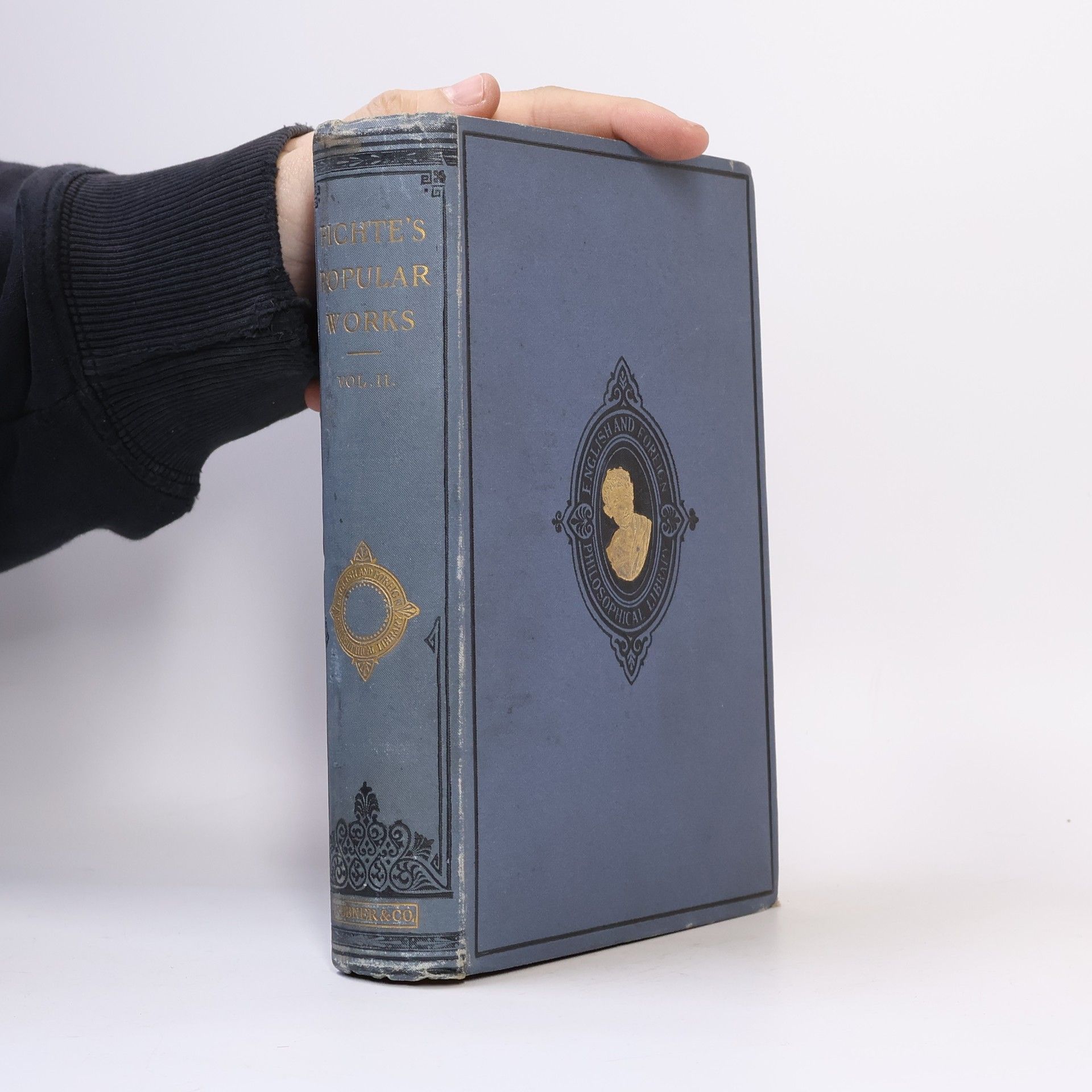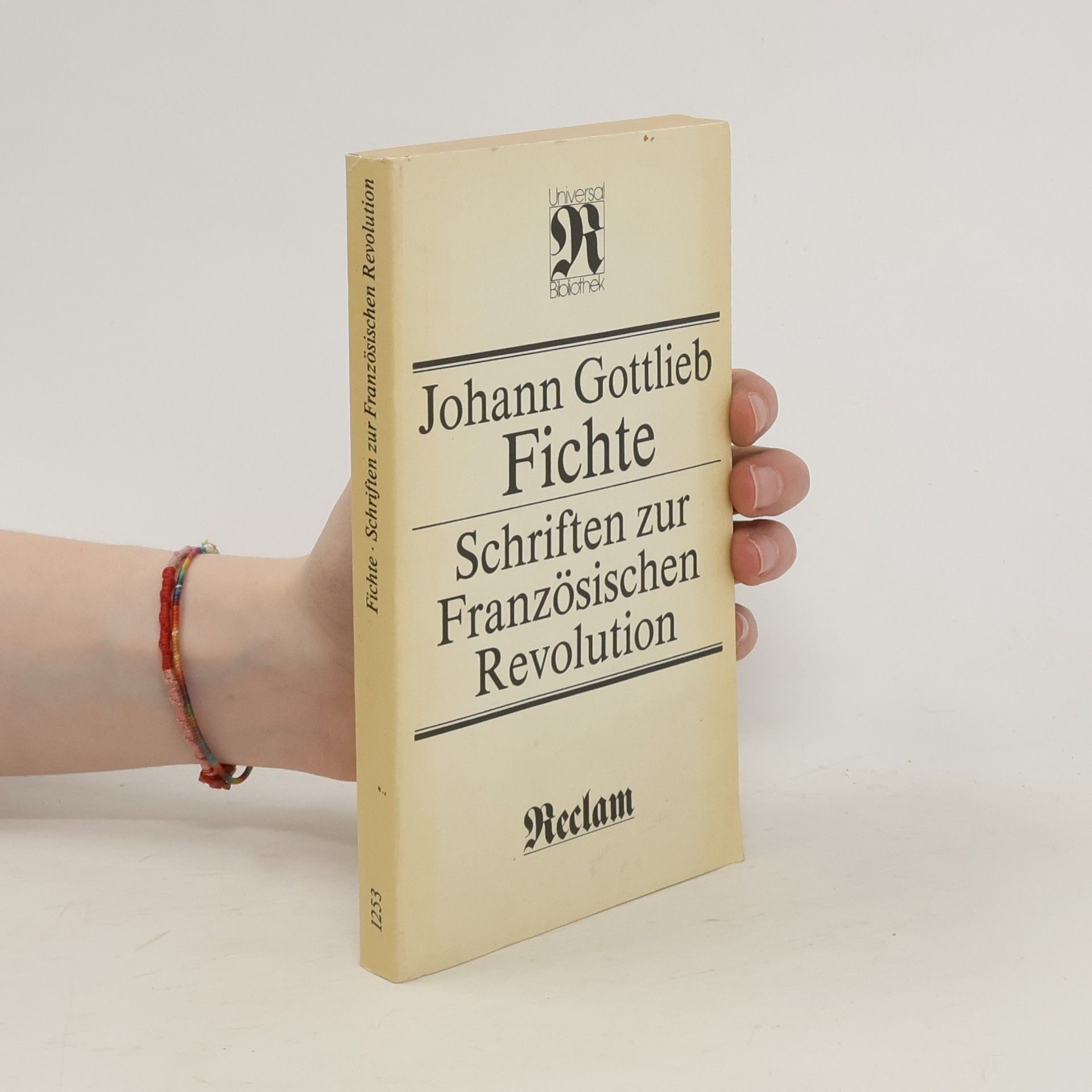The Science of Knowledge is an unchanged, high-quality reprint of the original edition of 1889. Hansebooks is editor of the literature on different topic areas such as research and science, travel and expeditions, cooking and nutrition, medicine, and other genres. As a publisher we focus on the preservation of historical literature. Many works of historical writers and scientists are available today as antiques only. Hansebooks newly publishes these books and contributes to the preservation of literature which has become rare and historical knowledge for the future.
Johann Gottlieb Fichte Boeken
Johann Gottlieb Fichte was een Duitse filosoof en een spilfiguur in het Duitse idealisme. Zijn werk vormt een cruciale brug tussen de ideeën van Immanuel Kant en Georg Wilhelm Friedrich Hegel. Fichte's filosofische overpeinzingen werden diep gemotiveerd door de aard van zelfbewustzijn en waarneming, waardoor hij in gesprek ging met denkers als Descartes en Kant. Zijn bijdragen strekten zich ook uit tot de politieke filosofie, waarbij zijn gedachten over nationaal bewustzijn het Duitse denken aanzienlijk beïnvloedden.







New Exposition of the Science of Knowledge
- 208bladzijden
- 8 uur lezen
A treatise on epistemology that presents a systematic exposition of the nature and limits of human knowledge. The authors explore the conditions and requirements for human cognition, as well as the role of the knowing subject in the process of knowledge acquisition and validation.
Tři kratší spisy významného německého filozofa formulují základní principy tzv. vědosloví, jeho roli v rámci filozofického myšlení a formování sebevědomí. "O pojmu vědosloví" vymezuje principy tzv. vědosloví, filozofické teorie, která se pokouší zjistit, jak je vůbec možné lidské vědění jako takové: vědosloví je věda o vědě. Veškeré vědecké bádání však musí směřovat k nejvyššímu účelu lidstva, k "zušlechťování rodu", a z vědecké obce se musí šířit humanita v nejvyšším smyslu slova. "Druhý úvod do vědosloví" objasňuje podstatu Já a konfrontuje ji s Kantovým ideovým systémem. Poté upozorňuje na rozdíl, jehož ignorování znemožňuje adekvátní pochopení projektu "vědosloví": rozdíl mezi subjektivitou a individualitou. "Pokus o nové podání vědosloví" formuluje novou metodiku vědosloví. Větu, formulující princip sebevědomí, přestává chápat jako axiom, tedy zásadu, ale coby postulát, větu, formulující určitý typ jednání, jež vede ke konstituování Já. Zatímco axiom je věta, utvářející nějaké teoretické vědění, postulát zosobňuje větu, předepisující určité jednání. Praktická racionalita se tak má stát základem teoretické...
Podání Fichtova systému transcendentální filosofie, v němž autor znovu promýšlí stěžejní témata Kantovy kritické filosofie. Výsledkem tohoto pokusu o nové založení Kantovy kritiky je svébytné vypracování činného, sebe kladoucího Já a ústředního motivu obrazotvornosti jako základního konstituentu možné lidské zkušenosti o jevovém světě v jeho časovém, prostorovém a kategoriálním charakteru. Pojetí transcendentální obrazotvornosti jako těkání je tak nejen hlubším založením tohoto Kantem již zahlédnutého, avšak dostatečně nevypracovaného motivu. Zároveň totiž předznamenává formulaci těch filosofických stanovisek, s nimiž se můžeme setkat u myslitelů jako Deleuze či Sartre.
Mit seiner zweifellos wichtigsten religionsphilosophischen Abhandlung unternahm Fichte den Versuch, seine Wissenschaftslehre einem breiteren Publikum wenigstens in ihren zentralen Aussagen zuganglich zu machen und das Verhaltnis von gelebtem Glauben und wissenschaftlicher Reflexion klar zu bestimmen.
Der geschlossene Handelsstaat (Großdruck)
- 140bladzijden
- 5 uur lezen
In "Der geschlossene Handelsstaat" entwirft Johann Gottlieb Fichte eine visionäre Idee eines wirtschaftlichen Systems, das auf nationaler Selbstgenügsamkeit basiert. Er argumentiert für eine staatlich regulierte Wirtschaft, die den Handel innerhalb der Grenzen fördert und gleichzeitig die Abhängigkeit von ausländischen Märkten verringert. Fichte betont die Bedeutung von Bildung und moralischer Erziehung für die Bürger, um ein harmonisches und produktives Zusammenleben zu gewährleisten. Sein Werk reflektiert über die sozialen und politischen Implikationen einer solchen Wirtschaftsordnung im Kontext der damaligen Zeit.
In den berühmten Reden an die deutsche Nation (1808) entwickelt Fichte das Ideal eines auf philosophische Prinzipien gegründeten Staates, dessen höchstes Ziel die allgemeine Erziehung seiner Mitglieder zur Sittlichkeit im gemeinschaftlichen Handeln darstellt. Fichte begründet die Notwendigkeit der Erhebung der Deutschen gegen Napoleon nicht aus der Einheit der nationalen Herkunft, sondern unter Hinweis auf einen fortschrittlicheren Begriff des Staates.
Ve své vizi budoucí politiky zúročuje Fichte své zkušenosti s pozorně sledovanými revolučními událostmi ve Francii. Rozhoduje se vyhýbat se extrémním polohám chápání státu, za které považuje přílišnou liberalizaci i poručnický model. Koncepce uzavřeného obchodního státu přitom úzce souvisí s jeho pojímáním lidské přirozenosti a se snahou eliminovat sklon k nečinnosti, přibližující člověka k pasivitě přírody. Fichtova potřeba čelit úpadkovým rysům společenského vývoje nabízí ve své problematičnosti nadčasové téma prolínání myšlenky politických reforem s ideologizací lidského uvažování. Přeložil P. Bláha.


